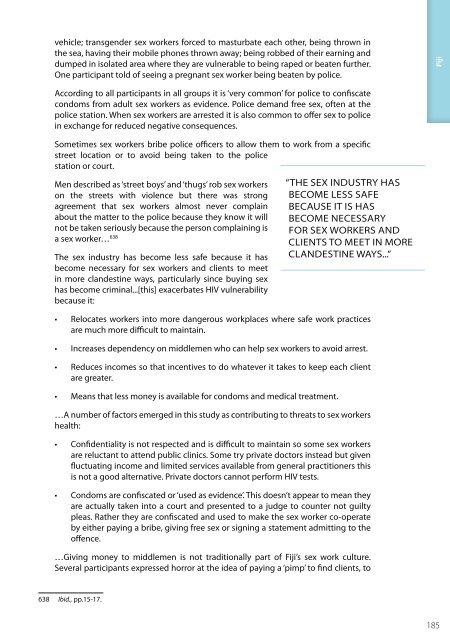SEX WORK AND THE LAW - HIV/AIDS Data Hub
SEX WORK AND THE LAW - HIV/AIDS Data Hub
SEX WORK AND THE LAW - HIV/AIDS Data Hub
Create successful ePaper yourself
Turn your PDF publications into a flip-book with our unique Google optimized e-Paper software.
vehicle; transgender sex workers forced to masturbate each other, being thrown in<br />
the sea, having their mobile phones thrown away; being robbed of their earning and<br />
dumped in isolated area where they are vulnerable to being raped or beaten further.<br />
One participant told of seeing a pregnant sex worker being beaten by police.<br />
Fiji<br />
According to all participants in all groups it is ‘very common’ for police to confiscate<br />
condoms from adult sex workers as evidence. Police demand free sex, often at the<br />
police station. When sex workers are arrested it is also common to offer sex to police<br />
in exchange for reduced negative consequences.<br />
Sometimes sex workers bribe police officers to allow them to work from a specific<br />
street location or to avoid being taken to the police<br />
station or court.<br />
Men described as ‘street boys’ and ‘thugs’ rob sex workers<br />
on the streets with violence but there was strong<br />
agreement that sex workers almost never complain<br />
about the matter to the police because they know it will<br />
not be taken seriously because the person complaining is<br />
a sex worker… 638<br />
The sex industry has become less safe because it has<br />
become necessary for sex workers and clients to meet<br />
in more clandestine ways, particularly since buying sex<br />
has become criminal...[this] exacerbates <strong>HIV</strong> vulnerability<br />
because it:<br />
“<strong>THE</strong> <strong>SEX</strong> INDUSTRY HAS<br />
BECOME LESS SAFE<br />
BECAUSE IT IS HAS<br />
BECOME NECESSARY<br />
FOR <strong>SEX</strong> <strong>WORK</strong>ERS <strong>AND</strong><br />
CLIENTS TO MEET IN MORE<br />
CL<strong>AND</strong>ESTINE WAYS...”<br />
<br />
<br />
<br />
<br />
Relocates workers into more dangerous workplaces where safe work practices<br />
are much more difficult to maintain.<br />
Increases dependency on middlemen who can help sex workers to avoid arrest.<br />
Reduces incomes so that incentives to do whatever it takes to keep each client<br />
are greater.<br />
Means that less money is available for condoms and medical treatment.<br />
…A number of factors emerged in this study as contributing to threats to sex workers<br />
health:<br />
<br />
<br />
Confidentiality is not respected and is difficult to maintain so some sex workers<br />
are reluctant to attend public clinics. Some try private doctors instead but given<br />
fluctuating income and limited services available from general practitioners this<br />
is not a good alternative. Private doctors cannot perform <strong>HIV</strong> tests.<br />
Condoms are confiscated or ‘used as evidence’. This doesn’t appear to mean they<br />
are actually taken into a court and presented to a judge to counter not guilty<br />
pleas. Rather they are confiscated and used to make the sex worker co-operate<br />
by either paying a bribe, giving free sex or signing a statement admitting to the<br />
offence.<br />
…Giving money to middlemen is not traditionally part of Fiji’s sex work culture.<br />
Several participants expressed horror at the idea of paying a ‘pimp’ to find clients, to<br />
638 Ibid., pp.15-17.<br />
185
















